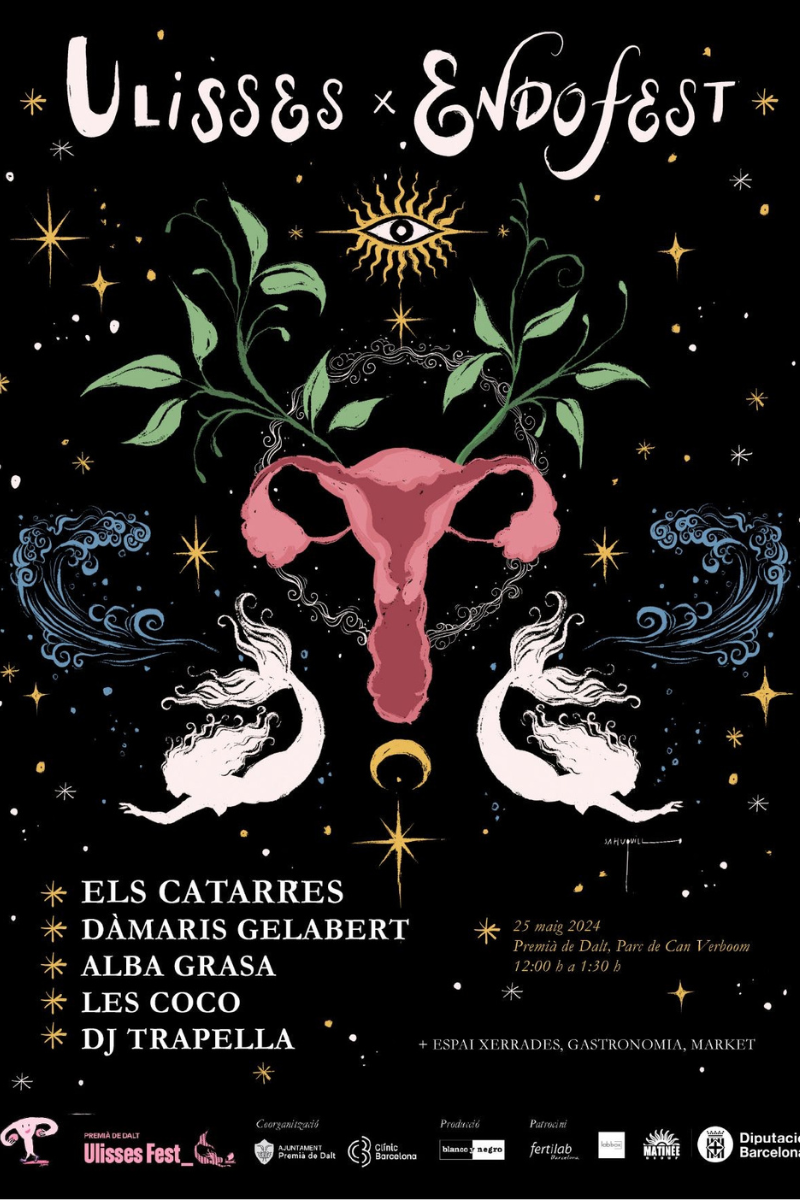One day we received an email from Anna Bassols introducing us to the Endofest festival, her project to make endometriosis visible and raise funds for research at the Hospital Clínic of Barcelona. We immediately connected because haramaki is a good companion during menstruation; It picks you up, soothes and lovingly comforts you.
Do you know what endometriosis is? Surely you have heard about it or perhaps you suffer from it since it affects one in 10 women of childbearing age. That's why we chatted with Anna about this silenced disease and her UlissesxEndofest initiative with which we are going to collaborate in the coming months by donating a portion of the sales of our haramakis.
We start with the big question: what exactly is endometriosis and what symptoms does it present?
Endometriosis is a chronic disease in which the endometrium, which is the tissue that lines the uterus, grows and implants outside the original cavity. This displaced tissue responds, like that of the uterus, to the hormones produced by the ovaries during the menstrual cycle, that is, it proliferates, detaches and flakes off during menstruation. This peeling produces ovarian cysts, nodules and adhesions.
For me, endometriosis is a strong, disabling pain; It is a lot of uncertainty and frustration but at the same time it is hope and struggle.
The most common symptoms are: dysmenorrhea (very severe pain during menstruation), pain during sexual intercourse, pain when peeing, pain when going to the bathroom, difficulties getting pregnant.
In your case, what was the path like until you found the diagnosis?
In my case, I have always had pain, since I can remember starting to menstruate. But it is true that, until approximately 3-4 years ago, I took anti-inflammatories or painkillers every month and it “worked”, normalizing the situation but not completely incapacitating me. About 4 years ago this anti-inflammatory treatment was no longer sufficient. That's when I say that the disease "broke out" on me, because I was admitted to the emergency hospital several times due to completely disabling and unbearable pain. After 3 or 4 months of hospital admission, I was diagnosed through an ultrasound in a gynecological clinic with a team specialized in endometriosis.
How did you feel?
Upon having the diagnosis I felt a double sensation: on the one hand I felt liberated and “calm” because I realized that it was not me who was “crazy” but that something was really happening but, on the other hand, I felt very lost, alone, sad and quite frustrated. I didn't really understand what all this could mean, the possible infertility scared me a lot, I didn't like the treatment that they explained to me that was available today (contraceptives), etc.
What implications does it have in daily life? And in the long term?
Endometriosis can affect daily life in many ways, depending on the moment, the woman, and the degree of involvement. In my case, it affects me during menstruation, with severe, disabling period pain that often leaves me unable to continue with my life and any leisure or work plans I may have. In addition, it can affect the search for pregnancy and fertility, becoming a very long and complex path. In my case, I have been trying to be a mother for more than 3 years, with failed assisted reproduction treatments, abortions and certain complications. In addition, it can also cause physical problems caused by inflammation, such as lower back problems or chronic pain and fatigue.
You decided to make endometriosis visible and support its research. Why is it silenced?
Yes, that's how it was and continues to be. I feel that there is a lack of visibility and awareness and that we have to break the silence. We have to break taboos and stop normalizing. The rule doesn't have to cause harm and, if it does, we don't have to shut it up. Personally, I think it has been very silenced and there continues to be a lack of visibility because it is a disease that only affects women and as such, it has remained invisible and ignored.
Tell us how the idea of the Endofest festival was born and how it has worked to date.
The Endofest project and festival was born, precisely, from this need to break the silence and the desire to make noise about it. Also the desire to “celebrate” a day, to get together and collaborate with culture and solidarity in the same event. The festival is that day when endometriosis does not disable me, when I celebrate life, solidarity, camaraderie and research. To date, two editions have already been held, with more than 3,000 people collaborating with the cause, being able to give more than €43,000 to the research carried out by the Hospital Clínic of Barcelona and on the verge of celebrating a third edition, on Saturday, May 25 , with the fusion of the Ulises festival, joining forces, under the name “UlissesxEndofest”

What role does the Hospital Clínic play?
The profits raised at the festival are given entirely to the Hospital Clínic of Barcelona so that they can continue researching the disease. Hospital Clínic is a reference center for the diagnosis and treatment of endometriosis. Every year, more than 400 first visits are made to patients with a diagnosis or suspicion of severe forms of endometriosis.
The Clínic has a multidisciplinary team that works together to provide individualized attention to complex clinical cases, with possible involvement of the urinary tract or intestinal treatment, with pain resistant to different treatments, requiring complex surgeries or with associated sterility problems. He is highly specialized in performing advanced minimally invasive deep endometriosis surgeries and is a pioneer in performing high-resolution gynecological ultrasound for endometriosis staging.
What reactions do you find in people when they learn about the festival and the objective behind it.
Very good. Everyone collaborates and does their bit. It is true that this is the most rewarding part of the project, the dedication of the people and the collaborations that take place. Patrons, sponsors, the Premià de Dalt City Council, the production company (Blanco y Negro), the Barcelona Hospital Clínic, the volunteers who collaborate on the day of the festival, and each and every one of the people who buy tickets make possible and that we can break the silence.
The two editions already held have been very beautiful days, attended by a very familiar audience, where we have enjoyed and danced for endometriosis.
What do you hope to achieve with this edition?
Enjoy a day like this again, continue making noise and giving voice to the disease that so many women suffer from and make a donation as large as possible to the Hospital Clínic for research. I hope that the Can Verboom Park is filled to capacity and we can celebrate its success on behalf of all the people who suffer from this disease and, without a doubt, also on behalf of all the people who collaborate.
Finally, you contacted us because we share a great goal, taking care of women's health. How do you think the use of haramaki can help with endometriosis?
I am very sure that haramaki can be very useful for women who suffer from endometriosis. I use it and it helps me. It keeps my entire pelvic area pampered and warm. It gives me the feeling of having a “hug” in a part of my body that often feels uncomfortable or painful.

We finish with our flash questionnaire to get a little closer to Anna Bassols:
- You have a nickname? No.
- Age: 33 years.
- Where were you born, where did you grow up? Dalt Prize.
- Who are you? A hard-working, happy person, a friend of my friends and eager to fight and make noise.
- What do you do for a living? I am an educator and social worker.
- What moment in life are you at? What moves or interests you? With a certain ambivalence, there are days of great motivation and joy and others of greater sadness or uncertainty. The illness greatly affects my daily life and I work very hard mentally to turn it around and smile every day.
- If you could spend a day in the skin of another being, what would it be? Penguin.
- A perfect day for you is... A day with my partner and my friends, in an outdoor space, during the day and celebrating.
- One color: Yellow.
- One love: My cats.
- A song: “Tot anirà bé”
- A farewell phrase: “Life is what happens when you laugh”
Remember! By purchasing your haramaki you will be supporting endometriosis research, since a part of the profits from sales will go to the Hospital Clínic of Barcelona in collaboration with the ENDOFEST Festival.





